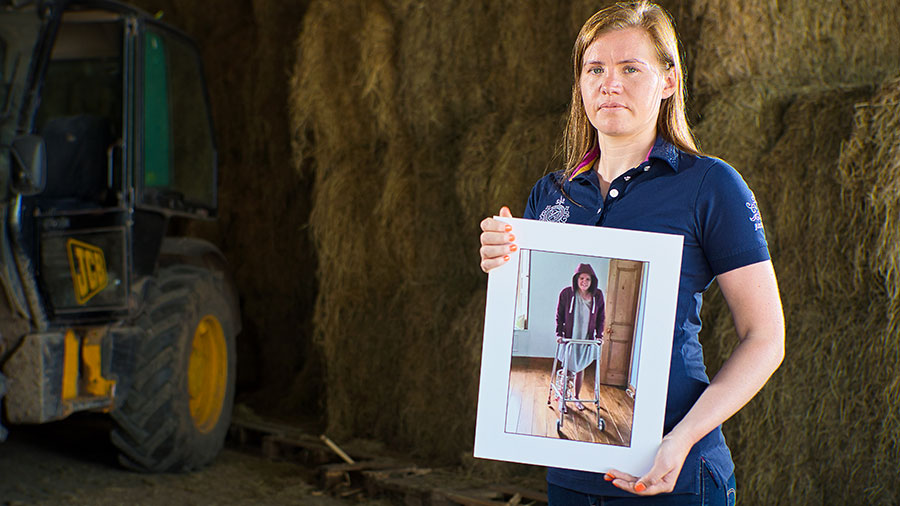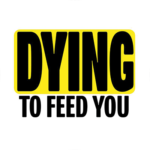Dying to Feed You: Grace suffered multiple broken bones
 Grace Addyman © Richard Stanton
Grace Addyman © Richard Stanton Grace Addyman suffered multiple broken bones when she was hit by falling bales at her family farm.
She tells us what happened on that day, the difficult surgery that followed and how she considers herself the “luckiest unlucky person ever”.
Watch the video and read the report below.
See also: Dying to feed you: James just cried and said ‘Mum, I’ve lost my arm’
It had been a wet summer and it was near the end of July. We’d cut the hay and it had been baled that day.
We were enjoying the weather, watching the baler go around the field and then bringing the hay in.
We farm near Knaresborough, North Yorkshire. My granddad bought the farm and my dad worked it as well.
My mum got me and my sister into riding horses when we were young – and my dad ended up absolutely loving horses, too.
Eventually, Dad diversified into having a livery yard here at the farm.
It was quite late by the time we started to bring the bales in. But there was a storm coming the next day, so we were working quite quickly.
I was putting some pallets down. As I was walking away from the bales, the stack behind me toppled over and two bales fell.
One knocked me face first to the floor and the other landed on my foot, so I was face down on the ground.
Trapped to the floor
They were big bales weighing half a tonne. One was lying on top of me and the other was on my leg.
Often on a farm you are on your own, but I was lucky my brother-in-law was there – otherwise I would have been lying trapped alone.
I just wanted to get up and I could feel the adrenaline pumping through me. My brother-in-law removed one bale.They called the ambulance and the fire brigade came to remove the other one.
My mum can still remember me screaming when they put me on the spinal board. When I was in the ambulance, I asked what had happened. They just said a bale had fallen on me.
The next thing I knew, I was waking up after 16 hours of surgery. I couldn’t see anything. I couldn’t open my eyes because my face had hit the floor and I had complex facial fractures.
Then I went back in for another six hours of surgery on my pelvis.
I remember not being able to think. Everything was just a blur.
I had suffered immediate extensive injuries – tibia and fibula open fractures, right leg femur fracture, multiple pelvis fractures, lower spinal fractures and complex facial fractures.
Trauma ward
After a week, I was moved to the major trauma ward. I was put in a room on my own.
At first I thought it would be great. But after a week of isolation, not so much. The physios had me sitting out on a chair each day – it was agony.
I was worrying every day about the outcome: my pelvic injury and the loss of blood. I wasn’t able to eat. I wondered what my face was going to look like. But I pushed through.
I decided there were other people worse off than me, and I was lucky to not be paralysed.
In the hospital, the doctors said I could make 70-80% of a recovery. I think they try not to get your hopes up too high. My recovery is still ongoing two years later.
I thought I was just going to stand up and walk away, because how can you forget to walk? It’s all about mindset.
About a year-and-a-half after the accident, I got on a friend’s horse – a little calmer than mine – and had a little ride.
I see dangers everywhere now that I never saw before. Don’t be that person, don’t take that risk. Just take a bit of time and be aware of danger. I never thought this would happen to me.
I’m probably the luckiest unlucky person ever. To walk away from this is just miraculous. I won’t be taking another chance – or taking anything for granted.
Work safely with big bales
“Big bales are often called ‘the silent killers’ because you don’t hear them coming and the weight is lethal,” says Oliver Dale, managing director of Safety Revolution.
“Grace appears to have been very lucky and to have had very good treatment.”
To minimise risks, Mr Dale offers this advice:
- Always handle bales with caution, which can be difficult at harvest when under pressure
- Make sure bale stacks are cross-tied and stable
- If a bale is damaged or twisted, don’t stack it
- Be extra careful with temporary stacks; just because the stack is only there for a short while does not make it less dangerous
- Avoid stacks from chasers being left; restack them to make safe
- Good treatment is good to see, but focus on prevention first. Be safe, don’t rush and always leave a stack in a stable condition.
Source: Safety Revolution
Dying to Feed You
 About the campaign
About the campaign
Farming has the highest number of workplace fatalities of all occupations. Farmers Weekly is pledging to use its voice, influence and reach to reduce the accident rate in agriculture.
Find out how you can be a part of helping us change agriculture’s safety record at fwi.co.uk/dying-to-feed-you
Partner message

The team at Safety Revolution are delighted to be working with Farmers Weekly to reduce deaths in agriculture and to show how we can work together to create safer farms.
Building strong and positive safety cultures delivers happy and safe teams, fewer incidents and improved productivity. We look forward to exploring individual case studies and shining a light
